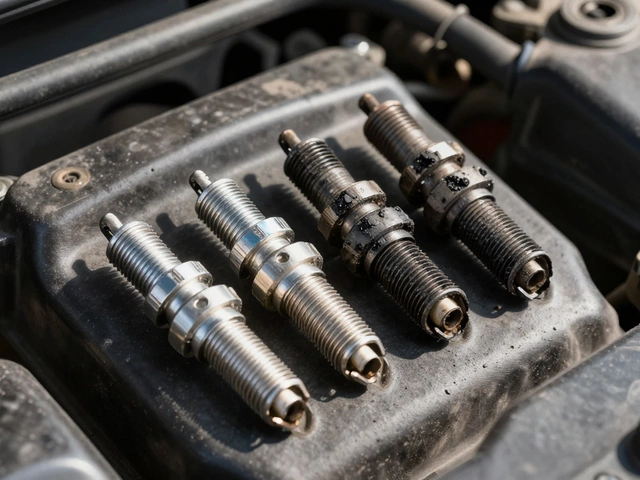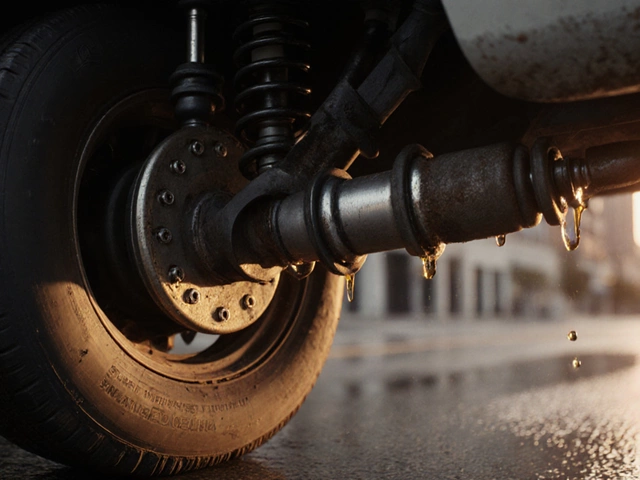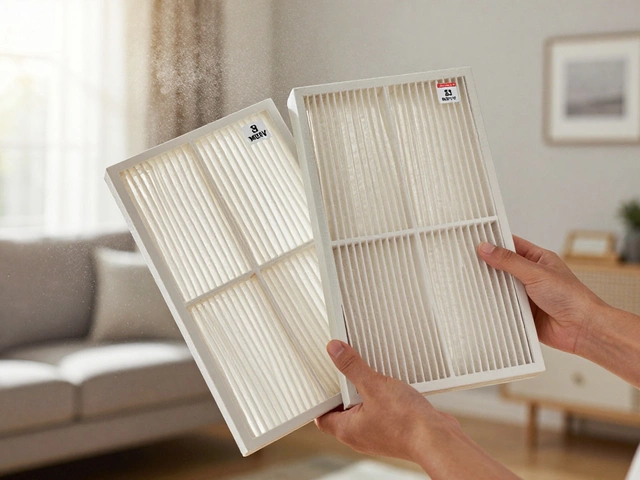Your car isn’t trying to be mysterious. When it needs oil, it starts making weird, annoying noises for a reason—because running without enough oil is like riding a bike with no chain. If you ignore these sounds, your wallet’s going to hurt down the line.
The most common noise you’ll notice? Tapping, ticking, or knocking. It’s not a soft background noise, either. It’s sharp, often rapid, kind of like two metal rods hitting each other. That’s the lifters and valves begging for lubrication. Sometimes you’ll hear a deeper knocking, which usually means the bigger engine parts (like the crankshaft) are now involved. Not good.
- Why Engine Oil Matters
- Sounds That Say 'Add Oil Now'
- What Happens Inside a Low-Oil Engine
- Other Signs Your Car Needs Oil
- What You Should Do When You Hear These Noises
- Simple Tips to Prevent Low Oil Problems
Why Engine Oil Matters
If you’re wondering why everyone is always on about engine oil, here’s the deal: it all comes down to protecting your engine and making sure your car keeps running without nasty surprises. Engine oil isn’t just some old goop that makes things slippery; it’s the lifeline of every moving part under your hood.
First, engine oil creates a thin barrier between metal parts that would otherwise grind against each other. Think of it as putting butter on a hot pan—without it, things stick and burn way too fast. It stops wear and tear, so your engine doesn’t chew itself up from the inside.
Second, oil helps pull heat away from engine parts. Your engine gets seriously hot, and if oil isn’t flowing, things heat up so much that metal parts can actually fuse together. This is why running out of oil leads to a “seized” engine—it’s basically fried.
There’s also this bit: oil works as a cleaner. Over time your engine collects dirt, metal flakes, and gunk, and the oil traps them, sending them to the oil filter. Skip oil changes and that filter clogs, letting sludge build up and block oil pathways—that’s asking for trouble.
- Lubrication: Stops metal-on-metal contact and weird noises.
- Cooling: Pulls heat away so nothing overheats and melts parts together.
- Cleaning: Debris and gunk get carried out with the oil so things don’t get clogged.
Here’s a quick look at what soaks up engine oil the most inside your car:
| Engine Part | Why It Needs Oil |
|---|---|
| Pistons | Slide up and down in cylinders—oil clings to stop them grinding. |
| Camshaft | Spins fast; oil keeps it from heating up and wearing down. |
| Lifters & valves | Constant tapping motion; need oil to quiet down and last longer. |
Miss out on regular oil changes or drive around with a low oil level, and you’re signing yourself up for expensive repairs. Running with enough clean oil doesn’t just keep your car silent—it keeps it alive.
Sounds That Say 'Add Oil Now'
Your engine isn’t subtle about oil problems. Certain sounds start cropping up when you’re running low on engine oil, and every car owner should know what they mean. Catch them early, and you might walk away with just an oil change instead of a full engine rebuild.
Here’s what to keep your ears peeled for:
- Tapping or Ticking Noises: This is usually the first sign. It tends to tick faster as you rev the engine. Most of the time, it’s coming from the valvetrain, which is the set of parts that opens and shuts engine valves. Not enough oil means these parts aren’t getting the smooth coating they need, leading to metal-on-metal chatter.
- Knocking or Rumbling: This sound is deeper and slower, and it spells trouble. It means the crankshaft, bearings, or connecting rods aren’t being covered by engine oil, so you’re hearing them slap against each other. Ignore this sound and you could be looking at thousands in repairs.
- Grinding or Growling: Rare but possible, this usually only happens when the oil is dangerously low or completely gone. The engine parts are scraping and scuffing against each other. At this point, damage is basically a guarantee.
How often do people actually notice these sounds before things go wrong? Studies by major auto organizations (like AAA and J.D. Power) show that nearly 30% of roadside breakdowns are caused by engine lubrication issues, including running low on oil.
| Engine Sound | Possible Cause | Action Needed |
|---|---|---|
| Tapping/Ticking | Low oil, lifters/valve trouble | Check oil level ASAP |
| Knocking/Rumbling | Severe oil loss; bearing damage | Stop driving, add oil or tow |
| Grinding/Growling | Critical oil loss, engine damage | Stop immediately, call a mechanic |
If you think you hear anything like this, don’t just turn up the radio and hope for the best. These car sounds are your wallet’s early warning system.
What Happens Inside a Low-Oil Engine
If your engine is running with low engine oil, a whole bunch of problems happen fast. Oil’s job is to create a slick barrier between metal parts, so they don’t grind directly against each other. Take that barrier away, and metal-on-metal contact starts up. This isn’t just uncomfortable for your ears—it’s super rough on your engine’s insides.
Here’s what’s really happening:
- The lifters and valves in your engine need a constant film of oil. With less oil, they start tapping or ticking as they hit dry metal.
- Heat starts to build up. Oil not only greases things, but helps to cool them. Lose oil, and engine temps can shoot up fast—sometimes by as much as 30°F in minutes.
- The main bearings (these are big, heavy parts that keep your crankshaft spinning) can’t stay lubricated. When these go dry, you’ll hear a knocking or thumping noise, which is basically the sound of engine parts beating each other up.
- Makeshift friction starts wearing everything down. That thin layer actually saves your engine from grinding itself to pieces.
To put it into perspective, running just 1 quart low can take years off your engine’s life. If you drive with hardly any oil at all, you’re risking complete engine failure. In fact, according to some auto repair surveys, low-oil-related engine damage is one of the top five causes of total engine replacement.
| Engine Oil Levels | Risk of Major Damage |
|---|---|
| Full | Very Low |
| Down 1 Quart | Moderate |
| Down 2+ Quarts | High |
| Empty/Very Low | Critical |
Long story short: when you hear those car sounds screaming for oil, you’re literally catching your engine chewing itself up. Respond fast and you might avoid huge repair bills later. Don’t roll the dice—engine oil isn’t optional.

Other Signs Your Car Needs Oil
Noises aren’t the only clues. Cars have a handful of ways to scream, “Hey, add some engine oil!” long before parts start banging together. Catching these early makes life way easier.
- Oil Warning Light: If your dash throws up that little oil can or the word “OIL,” don’t ignore it. The sensor inside is there for a reason. Even flickering means trouble is close.
- Low or Dirty Oil on the Dipstick: If you pull out your dipstick and see that the engine oil is below the minimum line or looks black and gritty, it’s time to take action. Fresh oil should look amber, not like mud.
- Engine Overheating: Car engines need good lubrication to keep cool. If your temp gauge climbs fast and you know your coolant is fine, low oil could be to blame.
- Burning Oil Smell: If you catch a whiff like something’s frying, your car may be burning oil due to leaks or it’s so low that it’s overheating inside. Either way, check things out ASAP.
- Poor Performance or Stalling: When your engine is thirsty for oil, it works harder and rougher. It might hesitate when you step on the gas, or even stall at red lights.
| Warning Sign | What It Means |
|---|---|
| Oil warning light | Oil pressure is low |
| Ticking or knocking noises | Parts aren’t lubricating |
| Overheating | Not enough oil to reduce heat |
| Dark, sludgy oil | Oil is dirty, losing effectiveness |
If you notice any mix of these issues, don’t wait. Even just a quick oil change can keep your car from turning a small issue into a full-blown engine headache.
What You Should Do When You Hear These Noises
First off, don’t brush off engine tapping, ticking, or that dreaded knocking. It’s your car trying to save itself from big trouble. These car sounds screaming for engine oil aren't normal—and if you keep driving like nothing’s wrong, you’re flirting with engine failure. Here’s what to do, step by step:
- Pull Over Safely: As soon as you notice weird noises, find a safe spot and stop the car. Don’t wait until you get home or to work. Serious engine damage can happen in just a few minutes if it’s really low on engine oil.
- Let the Engine Cool: Pop the hood, but don’t touch anything yet. Let the engine cool off for about 10 minutes. Hot oil and parts can burn you.
- Check the Oil Level: Pull out the dipstick, wipe it, stick it back in, and check where the oil line is. If it’s below the “Min” mark or totally dry, you’ve found your problem.
- Add Oil If You Have It: If you’ve got spare engine oil in the trunk, top it up—any oil is better than running the engine dry. Just make sure it’s close to what your owner’s manual lists. Even the right amount of engine oil is useless if it’s the wrong type for your car, but in a pinch, top it off.
- Restart Carefully and Listen: Start your car and pay attention. Has the noise faded or stopped? If it lingers, don’t risk it—turn off the engine and call for a tow.
- Don’t Ignore It: Even if the noise goes away after topping up, book an oil change and get the car checked. There could be a leak, a faulty oil pump, or oil burning inside the engine.
To see how quickly things can go south driving with low oil, check out this table:
| Engine Condition | Minutes to Major Damage |
|---|---|
| Low Oil (not empty) | 20–30 minutes |
| No Oil | 5–10 minutes |
| Fresh Oil, but old filter | 1–3 months |
If you regularly ignore oil change reminders, you’re gambling with your engine’s life. Cheap engine oil maintenance beats a pricey rebuild every time.
Simple Tips to Prevent Low Oil Problems
Keeping your car topped up with engine oil isn’t rocket science. The trick is sticking to a few basic habits that save you from engine trouble and the nasty car sounds nobody wants to hear. Let’s break down some practical ways to avoid low-oil headaches.
- Check your oil level before long trips. It takes less than a minute. Pop the hood, pull the dipstick, and wipe it off. Put it back in, pull it again, and look at the level. If it’s below the ‘min’ line, don’t wait—add oil.
- Don’t skip oil changes. Most cars need fresh oil every 3,000 to 5,000 miles (or according to your manual). Dirty oil breaks down and stops protecting your engine. Waiting too long? You invite problems like ticking, knocking noise, or even major repairs.
- Pay attention to your dashboard oil light. That light isn’t just a suggestion. If it flashes or stays on, pull over as soon as it’s safe. Engine damage from no oil happens stupid-fast. Don’t chance it.
- Watch for leaks where you park. Even a few drips underneath your car adds up over time. If your parking spot looks like an art project, see a mechanic before you’re left stranded.
- Use the right oil type. Not all oil is created equal, especially for newer cars. Check your owner’s manual and don’t just grab any old bottle off the shelf. Wrong oil can lead to poor lubrication and noisy engine oil problems.
| Habit | When to Do It | Why It Matters |
|---|---|---|
| Check oil level | Every month & before trips | Early warning if you're running low |
| Change oil | 3,000 – 5,000 miles | Keeps engine parts clean & lubricated |
| Look for leaks | Whenever you park | Leaks can cause sudden low oil |
"Running a car on low oil is basically a guarantee for engine failure in the long run. Basic checks save thousands in repairs." – Car and Driver
Getting in the habit of catching oil problems before they start is the easiest way to make your car last longer. Trust your ears, your dashboard, and your own two eyes. It’s cheaper and way less stressful than that tap-tap-knock from under the hood.







Write a comment